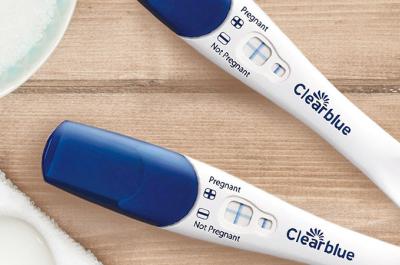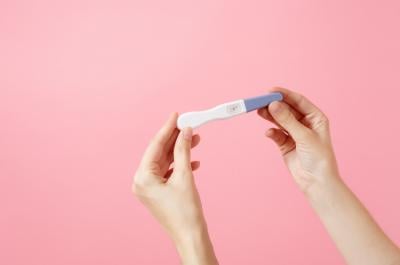Early Pregnancy Signs and Symptoms: Why are you so tired?

If you’ve noticed your sleep patterns are different to usual, you could be pregnant, at least that’s what the research from Clearblue’s partner March of Dimes says.
Although changes in sleep patterns is one of the most common early signs of pregnancy, there are many other signs and symptoms to look out for. These include a late (missed) period, tender or sore breasts, feeling sick (at any point during the day), mood swings, changes in tastes of food, needing to go to the bathroom more frequently and/or stomach cramps. You might also find that you are particularly tired all of a sudden. And now a growing body of research is looking into the earliest signs of pregnancy.
Understanding what happens in these first few weeks, days even, can help us understand why some pregnancies end in these early stages and why some progress differently to others.
Sleep is an area which is poorly understood in general, and even less is understood about the impact sleep has on pregnancy, both when trying to conceive and on pregnancy outcome.
A new study has found that both a shift in your schedule (for example, wanting to get up later in the day, or go to bed earlier) and changes in activity levels are a normal part of healthy full-term pregnancies. You can read the full study in the Journal of Biological Rhythms.1
Why am I so tired?
The team at Washington University, St. Louis found that women and mice(!) both shift their daily schedules earlier – in some cases up to a few hours earlier – from the first days of pregnancy right through to the days before birth and that their activity levels decrease significantly through pregnancy.
In the US one in ten babies is born too early2 (before 36 weeks). Shift work and other disruptions of a regular sleep-wake schedule are associated with early birth, but little is known about these changes through pregnancy and how important they might be for a healthy pregnancy.
"This is a very important first step in understanding what's happening in pregnancy, and it has a potential to inform our ability to intervene and prevent preterm birth in certain populations," says Carmel A. Martin-Fairey, postdoctoral fellow in the department of Biology in Arts & Sciences and in Obstetrics and Gynecology at the School of Medicine.
The team tracked 39 women from St Louis (who were also taking part in a larger on-going study of 1000 births) continuously from two weeks before they tried to conceive and then throughout pregnancy. They also studied a group of mice; tracking their pre-pregnancy and during-pregnancy activity by observing the time that the mice spent on a running wheel.
In mice, the shift in daily activity happens three days into pregnancy and lasts right through to 10 days before birth. In women, a shift in daily schedule of up to a few hours is seen in the first-third of pregnancy, followed by a gradual return to their previous daily schedule before birth.
"For the mice at least, the fact their activity advanced so early in pregnancy was surprising. We had no idea," says Sarah England, the Alan A. and Edith L. Wolff Professor of Medicine in obstetrics and gynecology. Dr England is associate program director of the March of Dimes Prematurity Research Center at the School of Medicine and a co-author of the study.
Activity across the entire pregnancy is reduced significantly, in both women and mice.

Professor of biology in Arts & Sciences
"There’s the fatigue perhaps, or extra work that’s required to carry a baby. But there’s something about the daily timing system that’s changing early in pregnancy probably due to the hormones that are associated with pregnancy" says Erik Herzog, professor of biology in Arts & Sciences and lead author.
Why does this research matter to you?
This research suggests that If you are feeling very tired in the early days and weeks of pregnancy, it’s more likely to do with the shift in your whole daily activity schedule rather than the effort of pregnancy in these early stages. Later in your pregnancy is when you will start to feel the load more:
“What happens in early pregnancy is that they [the mice] shift their total activity to earlier in the day,” said Herzog. “But they don’t seem to sleep more or be more active during their early pregnancy. It’s just a change in their daily timing.”
“Later in pregnancy, that’s when we start to see that they’re carrying a load and running less,” Herzog said,
Knowing this natural shift in your body clock is normal can help you make positive changes and work better with your natural rhythm in the early stages of pregnancy.
It’s also really important to look at your sleep patterns, making sure that you’re getting the right quality, quantity and timing for sleep (when you are trying to conceive). What this new research underlines is that sleep is an important factor for healthy pregnancy outcomes. Research shows that women who work at night or on rotating shifts may be at increased risk for preterm delivery than women who work day shifts.
"This finding is fascinating because while we know that miscarriage, preterm birth and other serious complications during pregnancy are linked to disruptions in a mom’s circadian rhythm, we don’t know how it works," says Kelle H. Moley, MD, chief scientific officer for March of Dimes in a statement. "This study takes us one step closer to understanding how normal circadian rhythm supports healthy pregnancy."
If you’ve been trying to conceive and then find yourself exhausted earlier in the evenings and waking way before the alarm, and you’ve noticed other signs or symptoms of very early pregnancy, maybe you are ready to take a test.
“Sleep in medicine is poorly studied,” says Emily S. Jungheim, Assistant Professor, department of Obstetrics and gynecology, school of medicine, Washington University in St. Louis “Even among healthy women and men — those who eat well, who exercise — the one thing they’re willing to do without a second thought is skimp on their sleep. A lot of people don’t pay attention to how important it might be.”
Make sleep an important part of your pre-conception preparation:
"…if you can identify a risk factor for preterm birth in a regular reproductive-age woman before she gets pregnant, you actually have time to modify it, and to see if you’ve fixed it — before she gets pregnant" Says Jungheim.
Future research will help to better understand the impact of shift work and other disruptions on early pregnancy health. In the meantime, understanding when and why sleep patterns change in early pregnancy can help you know if you need to take a test. Also, focusing on good quality sleep when trying to conceive can make a difference in achieving a healthy pregnancy.
If you think you might be pregnant then taking a pregnancy test is the only sure-fire way to be certain.
Funding
This work was supported, in part, by the March of Dimes Prematurity Research Center at Washington University. Carmel A. Martin-Fairey was supported, in part, by T32 HD049305 and F32 HD093269-01.
Source Materials from Washington University in St. Louis.
Note: Content has been edited for style and length.

Looking for insights on your health journey? Clearblue® sends you curated, science-backed articles right to your inbox.
- Martin-Fairey, C.A., Zhao, P., Wan, L., Roenneberg, T., Fay, J., Ma, X., McCarthy, R., Jungheim, E.S., England, S.K. and Herzog, E.D., 2019. Pregnancy Induces an Earlier Chronotype in Both Mice and Women. Journal of biological rhythms, 34(3), pp.323-331.
- Division of Reproductive Health, National Center for Chronic Disease Prevention and Health Promotion, Reproductive Health, Maternal and Infant Health, Preterm Birth: www.cdc.gov/reproductivehealth/maternalinfanthealth/pretermbirth.htm

What are the early signs of pregnancy?
There are various symptoms that can indicate you might be pregnant, even if you might not experience any/all of them.




